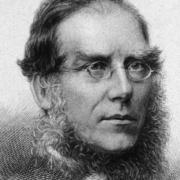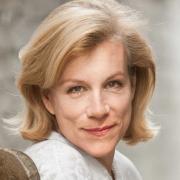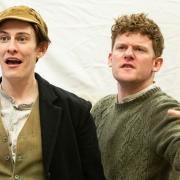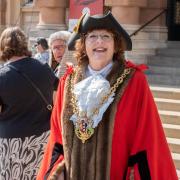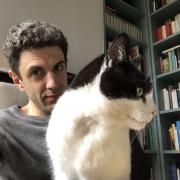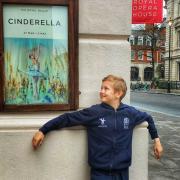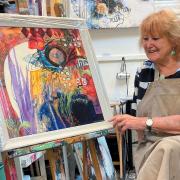Thousands will miss him... and he’ll miss them. Mark Murphy, the familiar voice that so many Suffolk people have woken up to during the past three decades, has left BBC Radio Suffolk. But you haven’t heard the last of him...
There are two things in Mark Murphy’s house which have pride of place. One is the trophy he received for News Broadcaster of the Year in the 2003 Radio Academy Awards. The other is his first BBC pay cheque, framed and displayed in his ‘man cave’.
‘It was £15 - I never cashed it in case I didn’t get another,’ he says. In fact, that cheque marked the start of a 33-year career with the BBC. During that time Mark’s become such a household name in Suffolk it’s hard to imagine he ever doubted his permanence.
But now his time with the national broadcaster is over and he’s moving on. When I meet up with him it’s just three days after he left the building in a much reported, surprising move - shocking even, given his constant presence for the past three decades, although perhaps not when you consider the current uncertainty around BBC local services.

If there’s any regret, it doesn’t show. He’s embarking on a new chapter in his career and bubbling over with exciting plans, even though he can’t reveal everything just yet. ‘Definitely not retiring,’ he says. ‘People keep saying, enjoy your retirement. I’m not retiring!’
Nevertheless, the public reaction to Mark’s departure has been understandably huge. He’s been with BBC Radio Suffolk since it started in 1990 and during that time has filled popular breakfast and drivetime slots, as well as Life’s a Pitch, Saturday’s lively Ipswich Town pre-match coverage.
He’s popped up at county events, great and small, hosting and helping proceedings along, led the BBC’s local coverage of some of the county’s biggest news stories, been a driving force behind major fundraising campaigns such as the EACH Treehouse Appeal, and is the creator of the county’s celebratory Suffolk Day. No wonder people call him a ‘legend’. What does he make of it all?
‘I’ve just been blown away, it’s been absolutely incredible. People have used the word legend, talking about me in the same breath as Terry Wogan and Ken Bruce, and I’m thinking, what? Really? Come on…’ He is, he says, hugely flattered, even though being called a legend makes him feel ‘bit of a fraud’.

‘I’m just so pleased that people have taken me into their homes, taken me into their lives. Radio is a very personal medium – I woke up with people every morning, I was in the car with them on the way to work.
‘I remember when radio presenters I used to listen to stopped - I was bereft because it was like losing a friend. People have called me a friend and wished me all the best. I’ve been absolutely bowled over, humbled by it all.’
A career in radio was always Mark’s ambition. As a boy, like so many of his generation, he listened to Radio Caroline and Radio Luxemburg under the bedclothes at night. It was a time when radio dominated popular culture.
‘I loved Tony Blackburn - loved the fact that you could go to work and play records, tell stupid jokes - go to work with Arnold,’ he says recalling Arnold the dog, Blackburn’s fictional studio companion.
Mark grew up in Ipswich, went to Northgate grammar school, but he says, wasn’t particularly academic. He knew he wanted to work in radio. ‘But there weren’t any media studies courses or anything like that in those days. I was half-decent at English, but journalism was never something that was suggested.’
No one in his family had ever reached sixth form or gone to university. ‘So, I left school with a few O-levels on the Friday, and started work on the Monday as an apprentice with a haulage company at Felixstowe.’

His idea was to finish his apprenticeship, then run a village garage. ‘I wanted to be the man that you take your car to, who you know and trust - can you imagine that?’ But finish it he did and went to work at Lancasters Mercedes Benz dealership in Ipswich.
Walking along Norwich Road one day, he passed Whitmores music store which had some new disco equipment in. ‘I bought some decks, speakers, lights, a machine that made the lights flash, the all-important smoke machine, and I created the Blitz Roadshow – “breaking the barriers of sound”.’
Set up in his bedroom, bass pounding through the floor, it wasn’t long before his mum suggested he ‘got out there’ and gave it a go. Convinced no one would actually hire him, Mark hired the upstairs room at the Suffolk Punch pub on Norwich Road on a Friday night, and charged £5 per family, including buffet.
‘I stood there playing the music, they started dancing. I was so shy and embarrassed I didn’t dare say anything. Then a taxi driver came up to me and said, “Taxi for Kersey” - that was a family that lived near us. I said they’re over at the bar, but he said, “I haven’t got time - it’s Friday night, boy, you’ll have to announce it.
‘So, my first broadcasting words were, “Taxi for Kersey” - and there was a huge round of applause. It was all I said all night.’ His first paid gig followed after a couple asked him to DJ their wedding, hoping he had plenty of records for ballroom sequence dancing.

‘I said, oh yeah, I’ve got loads. I hadn’t got any, so I went into Woollies in Carr Street and bought Sydney Thompson and his Orchestra, a pink LP, “dance floor fillers guaranteed”. I spun that and that’s how I got started.’
For a few years, Mark combined Blitz Roadshow with the day job, then in 1987 joined Hospital Radio Ipswich as a volunteer, ward visiting, chatting to patients, taking their requests. He was soon offered a chance on air, given some rigorous presenter training and a Sunday night show.
It was, he says, an excellent grounding. ‘Radio is a very intimate medium and Hospital Radio Ipswich taught me that really early on. It taught me that having contact and knowing what the listener wants is so important.’
Then, in 1990, along came BBC Radio Suffolk, announced in the East Anglian Daily Times. Mark applied for every job going, but got no interviews, so he put himself through some training courses, including “how to write a letter that will get you work in radio”, even though he’d already written plenty.
‘I’d written I live close to the radio station, I’m prepared to do anything, I’m prepared to work unsocial hours. What I hadn’t written was, I’m prepared to work for free.’ So, he wrote that and within 24 hours the BBC was on the phone. Two weeks before the station went on air, he was volunteering on Sunday mornings.
‘I answered the phones and made tea for Stuart White, and that was my big break at the BBC.’ Volunteering turned into a paid job and Mark decided to quit his job at Lancasters, who generously said he could go back if things didn’t work out. ‘That was the gentle push I needed. So, I eventually changed careers, at 27, as a freelance broadcaster.’
Even with a safety net, it was a risk. ‘I had a mortgage, steady job, good career prospects, good salary, good car. But my love was broadcasting, so to jump from that to a job with little security - because radio is an industry where some people don’t last very long - was quite scary.’
But Mark endured. In 1998 he got the drive time show, followed in 2000 by the coveted breakfast programme. Within two years the audience doubled and in 2003 came the prestigious News Broadcaster of the Year award.

At The Grosvenor Hotel in London, he was up against the likes of Radio 4’s Ed Stourton, experienced reporter Lise Doucet, and 5 Live Breakfast. ‘We went for a nice night out,’ he says, ‘then, all of a sudden, they called my name out and I had to go up on stage in front of the whole industry.
‘For a boy who grew up in a council house in Ipswich to end up getting that was just tremendous. I couldn’t believe it - it was the stuff of dreams.’
The award heralded a really successful time for the breakfast show. In Suffolk, it out-rated Wogan. More awards followed after Mark took the show to the US to celebrate the 400th anniversary of the founding of Jamestown (by Suffolk man Bartholomew Gosnold), and for his Don’t be a Tosser anti-litter campaign.
Campaigns ranged widely from getting St Edmund reinstated as England’s patron saint, to Bin a Blade, a permanent knife amnesty for Suffolk. And Suffolk Day, hatched in 2016 after a conversation, on air, with someone from Yorkshire, on Yorkshire Day. ‘I said why haven’t we got a Suffolk Day? We made a few phone calls and people were really supportive.’ Backed by the East Anglian Daily Times, the very first Suffolk Day was celebrated on June 21, 2017.
Some may question why a shy, retiring county like Suffolk needs a day to shout about itself, but for Mark, it reflects much of what he feels about the place that has shaped him, and his belief in localness.
‘It’s a day for us to pause, draw breath, and just appreciate where we live,’ he says, ‘to see what’s on our doorstep, tell people how great Suffolk is.’ He acknowledges that it’s a delicate balance. People come to Suffolk because it’s quiet and laid-back, yet we also need the economic benefits of tourism. Overdo it and we spoil that balance.

‘We tread a fine line, but we could shout about it a bit more, and that’s what Suffolk Day is all about.’ This year’s celebration will be hosted by Ipswich, the county town. Mark will be on the Cornhill at 8am for the proclamation and awarding of Suffolk medals.
Mark hopes his involvement will continue – it’s dear to his heart. But if you ask him what he’s most proud of he will tell you it’s the EACH Treehouse appeal, which raised £3million in 11 months. ‘Us and the East Anglian Daily Times - what a great local media partnership,’ he says. ‘We galvanised all of Suffolk and beyond - it was an incredibly emotional campaign.’
From the moment the appeal to build a new children’s hospice in Ipswich was launched the donations rolled in. ‘We had people rummaging down the back of the sofa trying to find money, pledging their time, doing bake sales, Lesley (Dolphin, former BBC Radio Suffolk presenter and Mark’s wife) climbed Kilmajaro – it was incredible.’
When the target was reached, Mark was ‘privileged’ to break the news on air. ‘I said, hello, I’m at the Treehouse, you’ve done it, we’ve raised the money. And burst into tears because the emotion was so great.’ The Treehouse is now built, of course, and when Mark drives past he gives it a little look. ‘I think that was team Suffolk at its very best, actually.’
Local broadcasting brings much darker moments, of course, perhaps none more so than the Ipswich murders of five local young women at the hands of Steve Wright. It was, says Mark, an incredibly tough time to live in Suffolk for everyone involved, but it also demonstrated the enormously important role of local media.
‘It was really important for us as a local broadcaster to make sure we covered that in a responsible and sensitive way,’ he says. ‘We knew some of the families that were involved. I knew the police officers dealing with it. So it was really important that we didn’t take on some of the sensationalist reporting that was done by our national colleagues.’
During the investigation, Mark hosted the breakfast show from Suffolk police headquarters four consecutive days. ‘The satellite trucks from the world’s media were there,’ he recalls. When, on the final morning, then Chief Constable Alister McWhirter arrived the media descended on him.
McWhirter, says Mark, rebuffed them, saying the only person he would talk to was Mark Murphy from BBC Radio Suffolk because it was a local story that would be reported sensitively by local people who would still be around after the national media had disappeared off to the next big story.
‘That showed to me the importance of good local journalism, that we don’t just flit in and flit out, we’re here for the long term and we care absolutely passionately about where we live. I know for loads of local journalists, they feel exactly the same. For me, it was a really good example of that being recognised.’
So, did he ever think about a national radio career? ‘Occasionally, once or twice, but not really. People said why don’t you go to a bigger station, bigger county. Why would I want to do that when I know Suffolk so well?

‘To start and finish my BBC career in a county that I love, where I grew up and where I live is very special to me, really special, and I’ve been able to make more of a difference to people’s live than I would if I’d been on national radio.’
And the future? ‘I’m hoping to do some things which I think will be really important to me,’ he says. He’s choosing his words carefully because he’s still in that sensitive time when he can’t say too much. ‘I’m hoping to work with a great charity based in Ipswich, very close to my heart.
‘I’m setting up my own media company, Mark Murphy Media, so I’ll be Youtubing, podcasting. I’ve got lots of great ideas for that. Some will sound fairly familiar to listeners to my old radio shows. We’ll be involving a couple of Ipswich Town legends.’ Fans of Life’s a Pitch take note.
So, there is life beyond radio. I wonder if he’d ever thought about it during those 33 years. ‘I never contemplated how it would end. I knew at some point it would – because every radio presenter has a shelf life. It’s important that you recognise that.
‘When the BBC said it was going to go in a different direction, and cut back on lots of local programming, I thought, actually, I don’t agree with that. I think local should be local. I think it’s important to represent local people, how they’re feeling, what they’re doing.
‘We’re different from Norfolk, we’re different from Cambridgeshire, we’re different from Essex, and I think we won’t be serving Suffolk licence fee payers. But the BBC decided to go in one direction, and so that’s given me the spur to go in a different direction.’
As the media landscape goes through seismic change, radio faces competition like never before, and Mark sees it becoming much more formulaic. ‘We had a lot of freedom, a lot more creative opportunities to push the boundaries and do different things, to be personalities, to be different. Is the older listener and the older viewer being ignored a bit? Yes, probably.
‘But radio is still huge – about 97% of the population still listens to the radio. There is still a demand out there for the big personalities, the news, specialist shows. There are podcasts, but you can’t beat a live radio show, listening to something that’s happening in the moment.’ And that all-important local voice, of course.
‘It’s about knowing the area, the challenges, remembering why a story or a person is important. I don’t think you can beat the experience of local journalism. Local democracy and accountability is really important. That’s why local communities need a strong local newspaper and to have strong broadcasters – you’ve got to hold people to account.’
Mark will also still be a local voice through his weekly column in the East Anglian Daily Times, which he loves writing. ‘It’s a different challenge, stretching me a bit as a broadcast journalist, which is good, but I really enjoy it and the feedback I get from readers.’
Because, above all, it’s that intimate relationship with the listener that Mark will miss about radio.
‘People have said to me over the years, oh, you’ve wound me up sometimes, but I always trust what you say,’ he says. This was particularly true during the pandemic. ‘They woke up in that uncertain time and they put their radio on, and the familiar voices that they knew and trusted were there every morning, telling them what was going on, helping them get through it, with community spirit.
‘It’s a real privilege to be invited into people’s homes. I’ll miss that. I hope local broadcasting and local journalism can carry on doing those kinds of things.
‘So it’s sad, but all good things have to come to an end. And I’m not stopping, I’m definitely not retiring! I hope to be helping people of Suffolk in whatever guise I can, because I love where I live – I don’t want to live anywhere else.’





